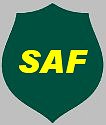| Back to |
|
|
| MSUE Resource Library | ||
| Newspaper Article Index | ||
| Forest Information Main Page | ||
| MSAF Home Page |

TIMBER
HARVEST AND TREE HEALTH
Article #44, February 2001
By Bill Cook
Forest insect and disease outbreaks seldom result in a need for a salvage timber harvest. Be skeptical if youíre asked to harvest your trees because of a forest health issue.
The Upper Peninsula has been, or will be, experiencing the effects of a number of pest attacks. Gypsy moth has a toehold. Forest tent caterpillar (FTC) will likely rage through the forests this spring. Beech bark disease has been discovered. However, none of these critters is a reason to jump start a harvest operation.
If youíre concerned about forest pests, contact the MSU Extension office, the County Conservation District, the DNR, or other natural resource outfit. Be sure that you have reliable information before acting on reports of forest pest damage.
Many parts of the U.P. were defoliated by forest tent caterpillar, aspen tortrix, and cankerworms in 1999 and 2000, especially aspen. The central U.P. tamarack have been seriously munched by the larch casebearer. Trees that are otherwise healthy will usually weather these outbreaks. Few trees will die.
In the eastern U.P., there is a new exotic pest called beech bark disease (BBD). Itís actually a combination of an insect and a disease. MSU Extension has a brand new publication about BBD.
Over the few decades, BBD will kill a significant portion of the beech resource. Management guidelines are available. You do NOT have to clearcut your forest or remove all the beech. Thereís plenty of time.
In some cases, harvest may be legitimately prescribed due to either current or impending insect or disease outbreaks. Harvest and regeneration of older balsam fir stands may be prudent with the onset of a major spruce budworm outbreak. The same may be true with mature jack pine and jack pine budworm. Oak wilt in northern red oak may be stemmed with a carefully applied timber harvest.
However, in all of the instances you should be working with the advice of a forester or two. And, there is always enough time to properly consider a timber sale.
The timber resource can have high monetary values. Non-monetary values also have a high priority. Treat your forest as carefully as you would any other high-value asset.
If you think your forest is experiencing a health threat, take the time to learn about it and have it investigated. Refrain from quick decisions based on a tidbit or two of information.
While timber harvest can be used as a tool to maintain or enhance forest health, donít be fooled into making a rash decision. There is usually ample time to figure out what the correct action is for your forest.
- 30 -
Trailer
Bill Cook is an MSU
Extension forester providing educational programming for the entire Upper Peninsula.
His office is located at the MSU Upper Peninsula Tree Improvement Center near
Escanaba. The Center is the headquarters for three MSU Forestry properties in
the U.P., with a combined area of about 8,000 acres. He can be reached at cookwi@msu.edu
or 906-786-1575.
Prepared
by Bill Cook, Forester/Biologist, Michigan State University Extension, 6005
J Road, Escanaba, MI 49829
906-786-1575 (voice), 906-786-9370 (fax), e-mail: cookwi@msu.edu
Use
/ reprinting
of these articles is encouraged. Please notify Bill Cook.
By-line should read "Bill Cook, MSU Extension" Please use the article
trailer whenever possible.
Michigan State University is an affirmative action equal opportunity institution. The U.S. Department of Agriculture prohibits discrimination on the basis of race, color, national origin, gender, religion, age, disability, political beliefs, sexual orientation, and marital status or family status. (Not all prohibited bases apply to all programs.)

This website is maintained by Bill Cook, Michigan State University Extension
Forest in the Upper Peninsula. Comments, questions,
and suggestions are gratefully accepted.
Last
update of this page was
22 September, 2005
This site is hosted by School of Forest Resources and Environmental Science at Michigan Technological University.